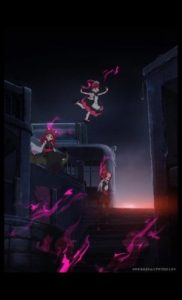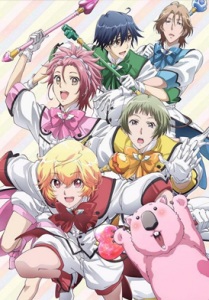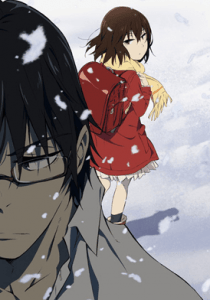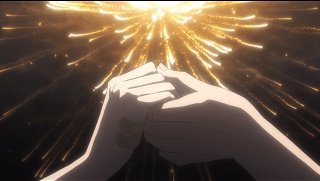Well, that was certainly a year, wasn’t it? Having survived yet another trip around the sun, let’s look back at some of the best things the anime world has brought to sf this year.
Since this doubles as an awards recommendation list, I’ve included studios, writers (“series composition” = head writer) and directors; if you’re planning to nominate some other show not listed here, I strongly recommend the Anime News Network encyclopedia as a more reliable source for anime credits than IMDb. Look for “Animation Production” to get the primary studio(s).
#3: Attack on Titan season 4 (or season 3 part 2)

Attack on Titan has come a long way since the poorly paced days of later season 1. Now it goes from strength to strength as it reveals more and more of its world without losing any of the fantastic action sequences that made it popular in the first place.
It was rumored that this season would be adapting a section of the manga where the author demonstrated Nazi sympathies. In the most pleasant surprise of the year, it turned out that nothing could be further from the truth. To see support for anti-Semitism in this section of Attack on Titan is roughly equivalent to claiming that The Fifth Season endorses slavery. Indeed, the problem faced by the heroes at the end of the season is to find a way out of a cycle of violence fueled by hatred.
Studio: Wit Studio
Chief Director: Araki Tetsurō
Director: Koizuka Masashi
Series Composition: Kobayashi Yasuko (based on manga by Isayama Hajime)
#2: Mob Psycho 100 season 2

Season 1 of Mob Psycho 100 was a dazzling display of animation with heart and soul to spare as it examined the toxicity of people who become too enamored with supernatural powers. Season 2 amped that up in every possible way with more amazing imagery, bigger battles, and a solid, unwavering goodness at its center. Even as the hero faces the storms of growing up and the realization that his mentor is not what he seems, he still finds the best possible way through every challenge.
Studio: BONES
Director: Tachikawa Yuzuru
Series Composition: Seko Hiroshi (based on manga by ONE)
#1: kemurikusa.

On the other hand, here is an ode to curiosity and exploration, with minimal action, looking like it was made on a budget of about ten dollars. How this wound up on Amazon, which goes mostly for gory slugfests, is a mystery. My best guess is that its buyer only read as far as “post-apocalyptic” and made some unfortunate assumptions.
Sure, kemurikusa. takes place in a dark, ruined world where a handful of people are in a constant struggle for survival, but the story is sf in pure discovery mode. Not a moment is wasted with grimdark as the small band of survivors unravels the mysteries of how the world and they came to be that way. It is an imaginative and original enough story to overcome all the limitations of its production.
Studio: Yaoyorozu
Director and Series Composition: TATSUKI
A few other scattered thoughts on this past year in anime:
- Bonus Hugo recommendation: Everyone please go check out the movie Penguin Highway, which is available on DVD and a variety of streaming services. It’s a whimsical little science fantasy right up until the point where you realize it’s actually cosmic horror.
- Regardless of whatever else it brought, 2019 is destined to be remembered in anime history as the year of the Kyoto Animation arson. The Hollywood Reporter has an excellent story on the history of KyoAni, the fire, and its aftermath. If you don’t want a recap of all that, then just know that the studio is still determined to move forward.
- Weirdest synchronicity of the year: Mob Psycho 100 reaching the part where Reigen is exposed as a fraud before the entire world right at the same time as Anime News Network finally decided to do serious journalism about Vic Mignogna. There were people who could claim that Reigen was still basically a good guy and the incident that led him to break with Shigeo was totally out of character (it wasn’t), and then, in the next breath, wonder how anyone could possibly still support an obvious creep like Mignogna.
- About that Mignogna coverage: Periodic high-profile waves of concern about Mignogna’s behavior are attested in anime fandom almost as far back as ANN’s founding, but, seriously, better late than never.
- In this moment of “OK Boomer”, let us give thanks for Dr. Stone pushing back against ageism.
Finally, 2020 brings one small style change to this column. In September 2019, the Japanese government that, starting on January 1st, all official documents in English should render Japanese names in Japanese order, family name first, reversing a change that has been in place since the Meiji reformation. Anyone else writing in English is encouraged to follow suit. This is not the first time this recommendation has been made; the Japanese Language Council was calling for it as far back as 2000.
Mainstream journalism is currently split on this (for instance, The Economist is switching, but most US news organizations won’t unless the AP Stylebook changes). The anime blogging world has been divided on the subject since anime blogging has existed. But surveys are finding that more Japanese people support than oppose such a change, and that’s enough to persuade me to switch.
As with transliterations in general, if an individual’s specific preference for how their name is rendered is known, I will follow that.
Having made it to the end of a decade as well, let’s take a traditional trip down memory lane to revisit the very best of it. (Yes, I hear you, pedant in the corner saying that 2020 is actually the last year of the decade, but the whole concept of assigning numbers to years based on a random point in a planetary orbit is artificial anyway, so can we agree to disagree?)
There were many, many good sf anime shows in the last ten years, so to simplify things, the method here will be to pick one best show from each year, then let them fight it out for the top prize.
2010: The Tatami Galaxy

How not great was 2010 for sf anime? One of its biggest short-term contributions to the genre was the beginning of a fad for shows providing a supernatural excuse for sibling incest. But it did produce one enduring recommendable favorite in The Tatami Galaxy, about a college student unwittingly trapped in a time loop by his dissatisfaction with his social life. The fluid, fantastical animation matches beautifully with the premise as shows the protagonist’s distorted view of the world.
2011: Puella Magi Madoka Magica

In contrast, 2011 was an extraordinary year. It produced the best video game adaptation ever. It produced the best anime take on Western superheroes ever. And it gave us Puella Magi Madoka Magica, the sucker punch that the magical girl genre still hasn’t recovered from.
Ever since Sailor Moon crossed them with fighting teams in 1991, magical girl stories had become about constant battles. Magica Madoka pointed out that this might not be a pleasant existence, and then turned the screws further by revealing that… well, go watch the show.
2012: Eureka Seven AO

2005-2006’s Eureka Seven was a mecha combat epic against a far-future backdrop amalgamating influences like Solaris, Blood Music, and skateboarder counterculture. Eureka Seven AO is a followup set on contemporary Earth, but not quite our Earth, with only one hint of a connection with Eureka Seven. What follows is a different sort of story, about a very different kind of threat, and about questions of identity. But it still has the mix of giant robot combat and hard sf, and is even less afraid than the first series to wear its fannish heart on it sleeve.
2013: The Eccentric Family

2013’s best work was a comedy-drama about tanuki living in Kyoto, part family drama and part murder mystery about the death of their patriarch. Everyone knows who killed him and how, but the question is, how did he allow himself to be in that situation in the first place? The cluttered, ancient city of Kyoto practically a character itself, alongside the family of lovable misfit tricksters.
2014: Kill la Kill

Studio Trigger burst out of nowhere with the premiere of its first series, a wild, cartoony romp that left even veteran anime viewers going, “What the heck did I just watch??”. Over the course of six months of episodes, it barely ever stopped to catch its breath, spinning a frenetic story of school battles, hidden conspiracies, and the significance of clothes. Nothing Trigger has done since has left quite the mark that this show did on fandom.
2015: Cute High Earth Defense Club LOVE!

In 2015, the attempt to block-vote the Hugo Awards left a lingering cloud of suspicion over anyone making short end-of-year best lists. I chickened out of doing my usual top three and instead just recommended eight good shows.
Well, it’s time to fix that. Cute High Earth Defense Club LOVE! was the best sf anime show of 2015. Just a gender-reversed Sailor Moon parody at first glance, it evolved into a rambunctious social satire, even going after the anime industry itself at times, its creative team brimming with all the confidence of people who were certain that once everyone saw this work, they would never, ever be allowed to make something like it again.
Unfortunately, the DVD sales numbers were excellent, and further seasons were ordered. They never had quite the same bite as the original.
2016: Erased

Although heavily abridged from the original manga, this story of a man given the chance to go back in time to be the friend an abused classmate needed and stop a serial killer is still a powerful one. The only sfnal device it needs is the never-explained time displacement; the rest is about fighting very human evils.
2017: The Eccentric Family 2

In 2017, the tanuki were back, still working out their family issues while trying not to become collateral damage in a tengu power struggle. Again it mixes comedy with a dash of drama wrapped in acres of beautiful art. The ending is less decisive, clearly waiting for another story, but the planned third one has yet to be written.
2018: Megalobox

2018 was the 50th anniversary of the boxing-themed manga Ashita no Joe, which is a revered classic in Japan, but practically unknown in the West. Who was going to care about the anniversary of some ancient sports story? Quite a lot of people, as it turned out.
Ashita no Joe followed a working-class hero in a situation that has no equivalent in modern Japan. So, to recreate the precariousness of his life, he was reimagined as a stateless person in a near future shaped by climate change and ever more sophisticated technology, trying to prove that there was still a place for good old human muscle and heart. It was a winner in every sense.
2019: kemurikusa.

And here we are back in 2019, where the best show of the year is by the guy who got kicked out of the director’s chair of an unexpectedly popular show and took the opportunity to go finish his low-budget passion project.
Honor roll of other very good shows that have happened this decade, for the benefit of people just scanning this section for suggestions: Tiger & Bunny, Steins;Gate, School-Live!, Nobunagun, Mushishi: The Next Chapter, Mob Psycho 100, Land of the Lustrous, Kagewani, JoJo’s Bizarre Adventure: Stardust Crusaders, Hakumei and Mikochi, Gatchaman Crowds, From the New World, Death Parade, Concrete Revolutio, Celestial Method
Best standalone episode of the decade: “And Then There Were None”, from 18if, which was not a good show on the whole, but had some truly sublime moments, of which this was the most sublime of all.
Honorable mention for being most obviously overdue for translation: Morimi Tomihiko, author of the books adapted for The Tatami Galaxy, The Eccentric Family, The Eccentric Family 2, and Penguin Highway. Yen Press is on it though, having just released translations of Penguin Highway and The Night Is Short, Walk On Girl (a sequel to The Tatami Galaxy, also adapted to anime, but as a movie), hopefully with more on the way.
And the sf TV anime of the decade is…
The thing about picking one show to represent a whole decade is that it can’t just be a great show in and of itself. Every decade produces plenty of shows with great stories, and innovative animation, and terrific productions. At a certain point it’s a matter of fine gradations of personal taste to say that one is wholly better than another.
The extra ingredient that makes a show truly one for the ages is the influence it has. We need to look for a show that has changed anime itself. And by that measure, there is only one candidate.

Puella Magi Madoka Magica was one of those works which fundamentally changed an entire genre. Like Sailor Moon before it, or Neon Genesis Evangelion for mecha shows, it set the context in which everything that has followed it is viewed.
It even has its own subgenre of imitators. And yet it still stands above all of them, because what none of the “dark magical girl” shows has yet grasped is that it wasn’t the pain and suffering that made this show a hit. It was the narrative of standing up to the system which was built on the pain and suffering and forcing it to change.
Madoka Magica is just as powerful and brilliant now as it was then, and a worthy show for saying: If you watch only one show from the last decade, make it this one.










